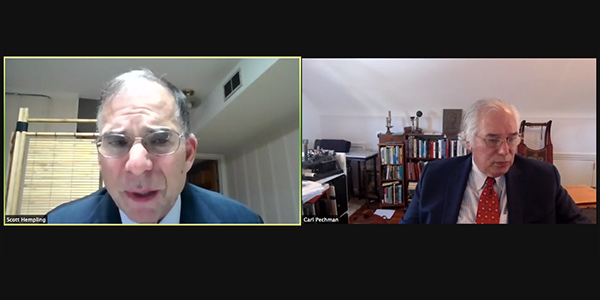Regulators respond to power industry mergers and acquisition pressure by ceding leadership, underestimating the negatives and accepting minor positives, lawyer and author Scott Hempling said Monday during National Association of Regulatory Utility Commissioners’ annual meeting.
“M&A applicants tend to frame a proposal as simple and positive, and commissions tend to start by viewing it that way, not as a transfer of a government-created franchise for gain; they view it as ‘oh, these people are coming and they’re going to bring us something,’” Hempling said. “The regulators don’t question what transaction they are precluding by considering a deal, and some commissions actually advocate for the transaction by trying to fix it with conditions.”
NARUC hosted Hempling, former director of the National Regulatory Research Institute (NRRI) to talk about his new book, “Regulating Mergers and Acquisitions of U.S. Electric Utilities.”
A self-professed “blunt-speaking” New Jersey native now living in the D.C. metro area, Hempling described his book between fielding questions relayed by current NRRI Director Carl Pechman.
Razzle Dazzle
When electric utility monopolies try to acquire other utilities “undisciplined” by competition, they present the deal in “wrapping paper” that distracts regulators, who tend to be unprepared and thus fall for the “WYSIATI” syndrome: believing that “what you see is all there is,” Hempling said.
These deals can be described as “mergers,” but they are acquisitions, and what is being acquired is control of a government-protected franchise to sell electricity, he said.
“Make the mental effort to think it through, and take a stand; define your terms; say you won’t accept too much debt buying the target, or you’ll only accept such a percentage of debt and why,” Hempling said. “There is no invisible hand in these government-created monopolies.”
Commissions have checklists instead of visions, he said. Laws tend to say only that a merger shall be consistent with the public interest, and so they grant regulators vast discretion over defining the public interest.
“I have looked and have yet to find a commission that has actually defined the public interest in terms of a vision … of enforceable expectations for the types of services that the public wants in a state,” Hempling said.
The term “economies of scale” is a marketing tool, not a data point, and people use it without understanding what exactly it means, he said.
Public Utilities Commission of Ohio Chair Samuel Randazzo asked Hempling whether he could identify any merger not driven by economies of scale that nonetheless has served the public interest.
Hempling replied that none came to mind, but he talked about a hypothetical situation in which a state seeks a better performing company to replace an incumbent utility.
“The issue is not economies of scale; the issue is somebody is more innovative; somebody can run a pipeline system without blowing up neighborhoods; somebody can run a transmission system without causing fires across thousands of acres in California … so I can hypothesize a transaction not driven by economies of scale but that does serve the interests of customers because its core purpose is performance,” he said. “These mergers have wrapping paper that talk about performance but … are not driven by performance.”
Pechman mentioned a current exception. “The city of San Diego is investigating reissuing the franchise to San Diego Gas & Electric, and they’re looking at alternatives, which could potentially lead to a merger in terms of providing better customer service,” he said.
Hierarchical Conflict
Harms may arise from the changed market structure, and the current era is characterized by a desire to decentralize supply, while at the same time PUCs are presiding over concentration of control, Hempling said.
“Remember that at the top of the merged company is a holding company. Well, the holding company has no statutory obligation to utility customers, so its private, for-profit aspirations can conflict with its utility subsidiary’s public service obligations,” Hempling said. “Let us not kid ourselves: There is conflict between the parent and the utility.”
As an example, he brought up D.C. regulators in 1999 getting Potomac Electric Power Co. (Pepco) to divest its generation assets because the district’s legislature wanted to introduce retail choice.
“Well, along comes Exelon as a prospective acquirer of Pepco,” Hempling said. “That merger was going to convert Pepco from a wires-only company into a minor subsidiary of a major generation owner, so you’re going to have a conflict, because a wires-only company is going to want low generation prices, and the generation company wants high generation prices.”
In approving Exelon’s acquisition of Pepco, D.C. regulators “completely ignored” their own policy of separating generation from monopoly distribution services, he said.
Public Service Company of New Mexico (PNM) is its own entity, but if acquired by Iberdrola, it will be a small part of a multinational conglomerate, he noted. (See Avangrid to Acquire PNM Resources for $4.3B.)
Regulators underestimate the conflicts, and “I have yet to see a commission decision that is straight about the private/public conflict,” Hempling said.
Commissions have erred in focusing on avoiding harm rather than maximizing benefits, and “there is a failure to recognize that now that Exelon has bought Pepco, it can buy anybody else,” he said. “When the Connecticut commission approved Iberdrola’s acquisition of United Illuminating … did the commission think about whether Iberdrola would next be acquiring [PNM]? Does it matter?”
Hempling credited reading the work of behavioral economists in helping him understand what it is about the regulators’ mindset that causes them to make what he believes are legal and logical errors.
“I will argue that there’s a passion gap … as exemplified by the maximizing return versus no harm, and that passion gap leads to deference,” he said. He faulted regulators for taking mental shortcuts, opting for automatic thinking instead of making the effort required to find what is best for the public interest.
The aim is a deal that is excellent, not the best financial engineering, Hempling said.




